Posts Tagged ‘Youth’
Peace like Breath
These days, peace feels hard to find. International conflicts, ongoing fall-out from COVID-19 and climate disasters can all disrupt our peace and well-being. Yet, at World Relief, we have the privilege of working alongside people who have overcome some of life’s great challenges, finding personal peace even in the midst of difficult circumstances.
That’s why, as a part of our inaugural World Relief Youth Writing Contest, we asked participants in World Relief Durham’s Mentorship Program to reflect on how each of us can be peacebuilders in our own lives and in the lives of those around us.
We are proud to announce Muhammad Hasham Ahmad as our 2022 contest winner! As the leaders of tomorrow, we believe refugee and immigrant youth have important things to say today — things we can all learn and grow from, no matter our age or where we’ve come from.
In his essay below, Muhammad shares how he believes we can all find peace, even in the midst of life’s challenges.
Peace has become a fancy word nowadays. Everyone likes peace but not everyone has it!
For me, peace means to be satisfied — to have a quiet and calm state of mind or simply to be in a situation where you are not worried about anything. From this definition, we can assume not everyone has peace.
Every year, there are millions of people who migrate because of problems they face that make them lose their peace. People leave their home country, some leaving their family and friends, to go to a new country in the hopes of finding peace.
Do you think they find their peace as soon as they land in a new country? No! They still have to face many problems in those new countries too — like my mom did.
She came to the U.S. without knowing any English. At first, she wasn’t able to communicate, but as time passed, she learned English well enough to be understood.
But still my mom worries as millions of thoughts cross her mind every day. Thoughts like: how am I going to provide for my children, myself, housing, insurance, finding work? How are my family back home doing? And many more worries…
Now, let’s talk about how children can lose their peace. Some come to the U.S. with little to no ability to write or speak English because they didn’t have the opportunity to go to school — like I didn’t.
Nowadays, all kinds of people lose peace in childhood because they are worried about living up to society’s standards. Standards like having good grades — fun fact: in an Asian household like mine, you better bring a report card home with all A’s! — a successful future, handling bullies at school, stress from moving, leaving old friends, getting along with new people and much more.
It is natural to lose peace while going through all of this. Everyone wants peace in their life, but not everyone knows how they can find it.
Peace may not be easy to find, but I remember something my teacher once said: “It is human nature to never be satisfied with what we have, so we worry about what we don’t have. If you keep worrying about something you can’t control, you will lose what you can control. So focus on your present rather than the future.”
This helps me find my peace.
We all should work on ourselves to become better, more peaceful people. Focus less on the expectations of others and worries about the future, and you will most likely find peace.
Lastly, I think peace should be as important as breathing. What happens if we don’t breathe? We die! In the same way, not having peace of mind slowly kills you every day and every moment. We lose our concentration and our ability to act and be in the present moment.
So work with the things you can control to save yourself from dying every day. That’s how we can all live a happy and peaceful life!
Pave the Path to lasting change. For young people like Muhammad, finding peace in a new home takes time. You can help create more opportunities for immigrant and refugee youth to heal, thrive and share their voices by joining our community of committed, monthly donors, The Path.
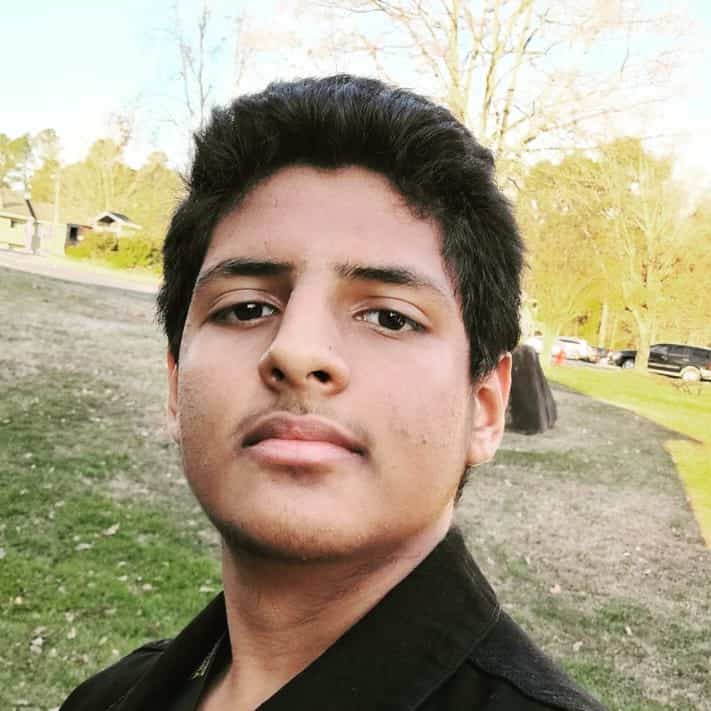
Muhammad Hasham Ahmad is 15 years old and lives in Durham, North Carolina. He came to the U.S. with his family four years ago after leaving his home country of Pakistan. He loves writing and making people laugh with his stories.
The Humble Lion
Samaki mkunje angali mbichi – Bend the fish when it is still wet and fresh
Mauridi Masumbuko admits that he lives by this Swahili proverb, and to hear him talk about his flexibility and adaptability you would think he had a lifetime under his belt to fully comprehend this invaluable lesson.
But Mauridi, known as Simba to his friends, is only 20 years old. The gregarious and excitable young man speaks upon the topics of faith, family and responsibility with wisdom and insight of someone twice his age.
Born and raised in a refugee camp in the region of Kigoma, Tanzania, Simba began attending spiritual classes with his father when he was just three years old. Although the classes were intended for older children, his father knew the importance of teaching children while they were young and impressionable, and Simba absorbed the Baha’i teachings like a sponge.
These fundamental lessons in his faith allowed him to see life through a unique lens. He found peace while shepherding his family goats in the quiet forests of Tanzania. He learned respect for elders when asked to run his father’s bike shop.
He gained responsibility as he earned extra money for his family, selling bags of peanuts at the beginning of local soccer matches. And he felt true kindness from a community that loved their neighbors as if they were family. This was his community.
Simba’s parents welcomed four more children while in Kigoma, and as the family grew, opportunities outside of the camp became more pressing. Collectively the family decided to apply for resettlement in a third country.
“One of the major reasons to go to the U.S. was the schooling opportunity, to provide for our family and [those] back home,” Simba said.
His father had anticipated the obstacles their family would face, and he encouraged them to remember why they left Tanzania. Once in the U.S., Simba recalls his father saying, “It’s not all of these other fancies – focus on what we talked about – our plan.”
“That kept us going…that was our fuel.”
Usiwe mwoga wakuuliza maswali – Do not be afraid of asking questions
On September 15, 2016, Simba’s family arrived in Durham, North Carolina with mixed emotions. The paperwork provided to them in the refugee camp had been in English – the family spoke Swahili – and the stock photos of a house, two cars and an airplane flying overhead led them to believe that it was a picture of their new life waiting for them in the U.S.
Simba laughs about this when recounting the story, but imagine his surprise when he walked into an 800-square-foot two-bedroom apartment outfitted for his seven family members.
The journey to find his new community in Durham was not easy. During his first year of American high school he was bullied, belittled and told to go home.
“[American] culture is way, way different…literally everything is different,” Simba said. “Making friends there it was like way, way easier because everyone was interested in everybody.”
During this time Simba enrolled in the Refugee Youth and Immigrant Services Department (RYIS) at World Relief where he found a mentor, Rob Callus, to help him through these early challenges.
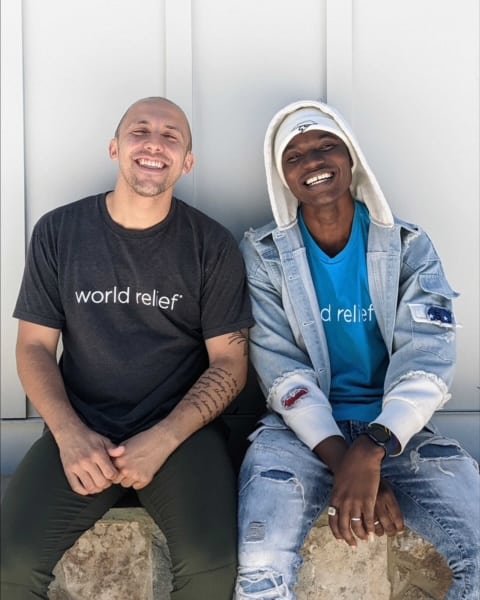
Although his freshman year was unforgiving, Simba found his stride in summer school. Within three months of asking questions, as his mom encouraged him to do daily, he became fluent in English. With the language mastered, he breezed through the academics of high school.
He served as a pseudo-teacher’s assistant for those classmates who had previously laughed at him, stolen his homework and told him to go back from where he came. Simba proceeded to make honor role nearly every semester henceforth. In May of 2019 he was named Durham Public School Student of the Month, and in June of 2020 he was awarded student of the year at C.E. Jordan High School.
Mauridi was not just given the nickname Simba by his peers because he happened to like lions, he proudly earned the title proving his strength, courage and bravery.
After graduation, Simba had an opportunity to answer a personal calling to serve Baha’i youth throughout the U.S., teaching many of the fundamental lessons he had learned as a boy in Tanzania.
A year later, he returned to World Relief Durham to serve as a Youth Fellow under the leadership of his mentor Rob.
Jina jema hungara gizani – A good name shines in the dark
Rob created the Youth Fellows program in 2019 as a stepping stone for former youth program participants. Youth Fellows is a paid position at World Relief Durham that helps former World Relief Clients like Simba gain employable skills such as time management, program development and team building while giving equal attention to higher education, civic engagement and personal development.
That summer, Simba became World Relief Durham’s very first Youth Fellow, and he wasted no time diving in and making the most of his new job. His personal experiences provided a unique perspective for Rob and his team, as he could better relate to the youth RYIS intended to serve.
“He already had the bones and tools inside himself,” Rob said. “Our team created spaces for him to let it shine.”
Like many young adults, Simba has a multitude of stressors competing for his time. He is juggling a full-time job as a Youth Fellow, attending college and assisting with his siblings’ education.
“I’ve learned a lot about meeting him where he is at,” Rob said. “When something is bothering him, you can tell. Some days we just need to sit on the bean bag chairs in the office and talk about school work rather than jumping right into the program for the day.”
It is no secret that Simba misses his home in Tanzania, and after hearing him passionately speak about the community and culture which so lovingly embraced him, I understand. When asked what he misses the most, without hesitation he says, “I miss the opportunity to see transformation in yourself.”
After reflecting on this answer, I wish that I had been courageous enough to sit with his raw, genuine and wise response. But in a hurried fix-all American fashion, I told him that he is transforming the community here. He kindly laughed and humbly said that he doesn’t necessarily think in those terms, but he continues to pray for the ability to be of service to others. Simba, the humble lion, you are already living out your prayers.
You can come alongside young men like Simba and create lasting change by partnering with World Relief. Give today to support programs like Youth Fellows or sign up to volunteer today.
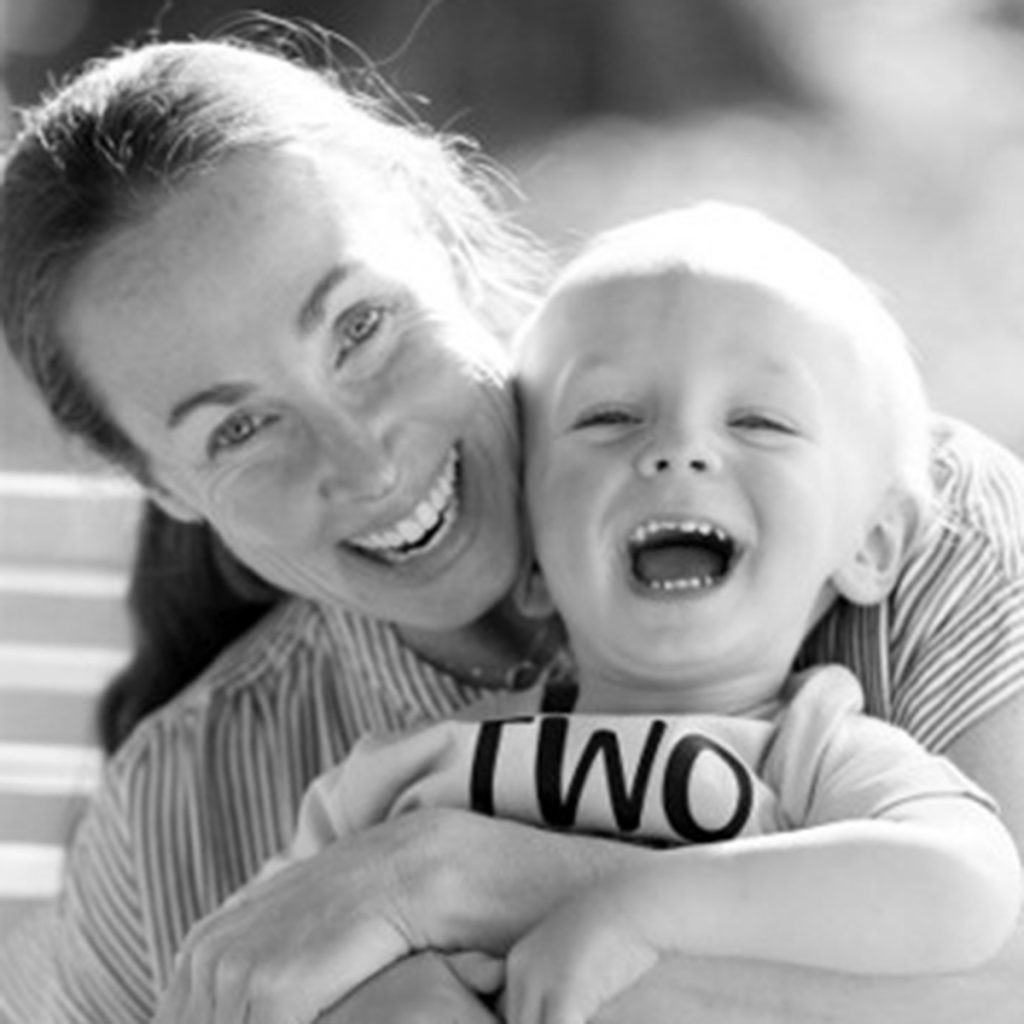
Adrienne Morton began volunteering with the local refugee population in 2013, when asked to teach English to a recently resettled family from Myanmar. She went on to serve as a Resettlement and Outreach Coordinator for Lutheran Services Carolinas. In 2019 she received an MA in Refugee Protection and Forced Migration Studies from The University of London, and currently works as a contract grant and content writer for World Relief Durham. She recently launched BELONG NC, a nonprofit dedicated to providing early education to local immigrant children, in addition to opportunities that empower their stay-at-home caregivers, like herself, to lead and engage in their new community.
Senior Spotlight: Mary Makuta gives back first
When Mary Makuta came to the U.S. in 2016 with her mother and four siblings, she hadn’t been to school in four years. Five years later, she’s preparing to graduate from Central High School, the first in her family to do so.
“My mom didn’t graduate high school. My dad didn’t graduate,” Mary said as a slow smile spread across her face. “I’ll be the first one in the family. I’m excited. I’m proud.”
And yet despite being the first one to graduate, Mary isn’t thinking about herself. Instead, she’s thinking of how she can give back to the community and be a role model to her brothers and sisters as she finishes out her final year.
“I want to be a role model for my siblings. I could see one of them getting there,” she said proudly. “They’re really smart, and I love them.”
With that in mind, Mary is doing everything she can to help them succeed. In the fall, she’ll be starting university as a business major, and, in her free time, she’ll be guiding her family through the American school system, just as World Relief Memphis did for her when she arrived.
“I’m trying to get them to be more active and join different clubs like Bridge. I heard that colleges like hearing that you join clubs or create them,” said Mary, 18. “My only reason [that I didn’t] was that my mom had to work after school, and I had to babysit. They won’t have to do that.”
Because Mary will be attending college close to home, she will continue to help her mother and siblings. With the freedom that comes with a college class schedule, Mary will babysit and work to ensure that her siblings can pursue all the opportunities available to them.
In fact, her first goal after high school is to get a job and help her mom buy a house. As a future realtor, Mary will be getting a first-hand look at the real estate market in doing so.
Before that, however, there is one thing that she must do first: help other refugees come to the United States alongside World Relief and UNHCR, the UN Refugee Agency.
“Real estate can wait,” said Mary, who is graduating one year early. “I want to work with them, volunteer—anything. It doesn’t matter. It’s a way of giving back.”
Before the pandemic struck, she had already decided how she would do so. She was going to volunteer in a refugee camp in Uganda, but the trip was cancelled as the situation around the world worsened.
With borders closed for the foreseeable future, Mary is looking into other ways to give back from her home in Memphis such as volunteering with World Relief.
“[Someone] volunteered when we got here, taking us about America—to buy groceries, to donut places. It was fun, and everything was new to us,” Mary explained. “That’s what I want to do—help new refugees coming to Memphis.”
Mary, we are so proud of all your hard work, and we hope to see working alongside us one day as we welcome our neighbors to Memphis!
If you want to get involved in the lives of our youth, fill out an application to become a Youth Mentor today.
Black History Month: Inspiration and Hope
As part of Black History Month, we’ve asked a few of the youth in the refugee community to tell us their experience learning about it. At World Relief, we work to honor and include all cultures and heritage, and celebrating Black history is just one way to do so. The last in a series of three, Mary Makuta tells us about her own inspirations within the Black community.
Food. Cooking. Hairstyles. Make-up. Technology. Transportation. The list could go on. When Mary Makuta first arrived in Memphis, everything seemed foreign to her.
Over time, however, she’s adapted, and the high school senior is now thriving in her new home. In June, she will be graduating from Central High School ahead of schedule. In just four years, she will have gone from seventh grade to graduation, and it’s all thanks to her hard work and determination.
When I spoke to Mary, she was on her way home from studying to go attend night classes. In order to graduate early, she takes double the normal class load, and she works part-time on the side as well.
Despite all her engagements, Mary still took the time to sit down and speak with me about Black History Month. In every country she’s lived in—the Democratic Republic of Congo, Rwanda, Namibia and the U.S.—she has always learned about history and found it important.
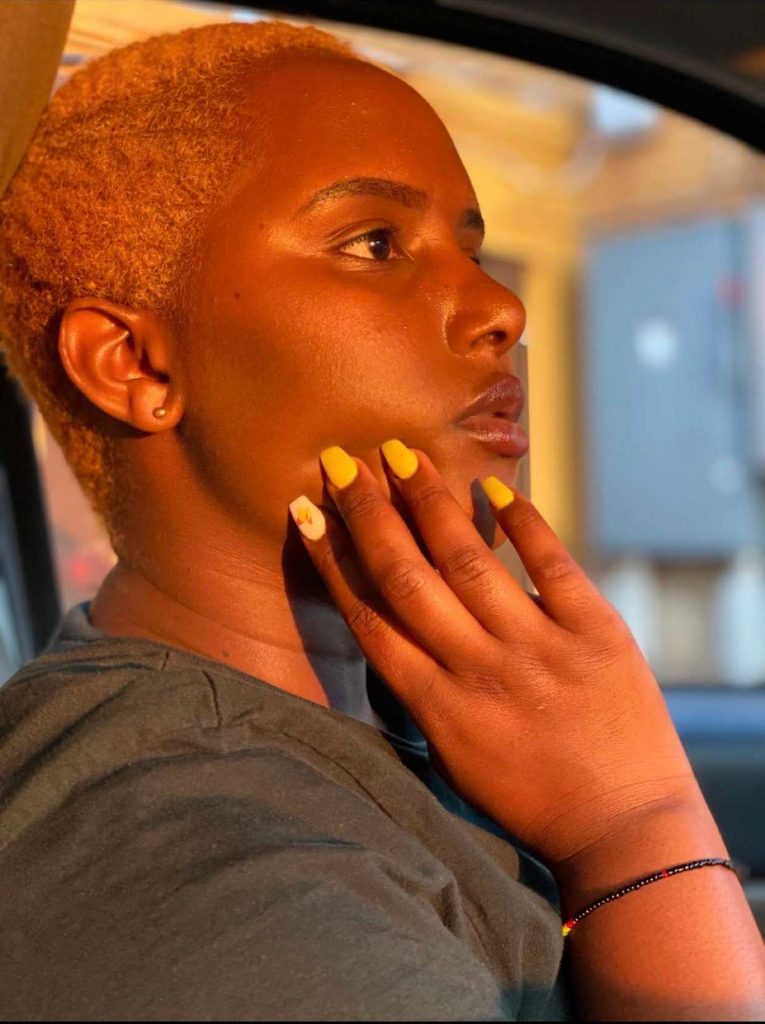
“What happened years ago, we can learn from it and not let it happen a second time,” said Mary, now 18. “People did many things for our country so that it can be better in the future.”
In particular, she remembers the prominent civil rights leaders of the 1960s. To her, they were “being brave for others. Even though they were scared, they did not give up.”
Their perseverance, alongside other prominent African American figures, are in part what inspire her today. Mary one day plans to be a prominent businesswoman, working in the real estate and transportation businesses.
Because for her, anything is possible now. The Obamas and others have proven that in recent years, and the brave work of civil rights leaders such as Martin Luther King Jr. and Rosa Parks helped pave the way.
“Kamala Harris, she said that every girl can one day be like her,” Mary told me at the end of our time together.
With that thought in mind, Mary has set her sights high, but we have no doubt she will succeed as she already has in balancing school, work and family life in a new country. And although she may miss her home in the Democratic Republic of Congo, we have no doubt that she will have a profound impact in her new community of Memphis.
Bailey Clark serves as the Communications Coordinator for World Relief Memphis. With a background in journalism and advertising, she is passionate about storytelling and its power to make a difference.
Black History Month: Many tribes but one culture
As part of Black History Month, we’ve asked a few of the youth in the refugee community to tell us about their experience learning about it. At World Relief, we work to honor and include all cultures and heritage, and celebrating Black history is just one way to do so. The first in a series of three, Emilienne, or Emily as she’s called in the U.S., tells us what Black History Month means to her in addition to her own culture.
At age thirteen, Emily Yope and her family moved to Memphis. For years, her family had been working to complete the paperwork necessary to move to a new country in hopes of avoiding the conflict in their home, the Democratic Republic of Congo (DRC).
Upon her arrival, Emily immediately wanted to return to her old home.
“I wanted to go back. The first day, everything was different: the food, the people, the language, the house and school,” Emily said. “But with time, I’ve gotten used to it, and now I like it here.”
What once seemed foreign has slowly grown to feel normal—speaking English instead of French or Swahili, eating pizza, even wearing different clothes. She’s been able to incorporate aspects of her own culture, such as continuing to make the traditional dish fufu, a pastry often served with meat and a sauce, alongside these new American traditions.
However, it’s been more than just adapting to American culture. In school, she’s also been introduced to Black culture and history during Black History Month.
“They talked about it in history classes, and they had programs for it,” said Emily, a senior at Central High School. “They celebrated it on Fridays after school. People sang and acted out important moments that happened. [They] recited poems.”
Out of all of this, the moments that stood out to her the most were the ones when words were put into action: “I love Rosa Parks, Martin Luther King Jr., Harriet Tubman. They stood up and did something. They stood up for themselves.”
As a student also coming from a different culture, Emily understands how essential it is to learn about others and value their differences.
“It’s important [to learn about Black history]. It’s cool to learn the cultures and history of people,” said Emily, now 18. “Their culture is where they came from—how life has been since they got here, and how it’s going.”
Over time, Emily would like to see some of her own culture or that of her fellow refugees included as well: “When it comes to my skin color, I’m one of them. But when it comes to my actual culture and traditions, it’s different.”
Some of those differences can be seen in something as simple as a name. In America, when you meet someone, you automatically call them by their name. In the DRC, however, you wouldn’t necessarily call someone by their name. If they’re older than you, for example, you would call them aunt or uncle.
“I had to get used to that,” Emily said with a laugh. “You get all these uncles that you don’t know, but just because they’re older than you, you call them uncle.”
Although this is just one of many examples Emily shared, there are certain things from her home that can still be applied to the U.S. today. The DRC has thousands of tribes, and each one of them has their own culture.
“People look the same, but this person belongs here, and that person belongs there,” Emily explained. “But when they meet, they’re all the same people. In America, it’s the same.”
Some people may be from Memphis, and others from California, but they all still hold certain values and cultural traditions in common such as the way they dress or the food they eat. In a way, Emily said, it’s similar to her home. Everyone has different cultures and stories, as can be seen with Black History Month or Hispanic Heritage Month, but everyone is still American.
These cultural differences are part of what makes America the United States of America, and, when the country was founded nearly 250 years ago, everyone who came did so with the hope of a better life, just as Emily and her family did.
Today, we celebrate those who came in addition to those who fought for a better life, such as Martin Luther King Jr., Rosa Parks, and the many others that came before and after them.
“I would love to go back and live in that time,” Emily said. “The fact that some people had to sacrifice to live better . . . I would love to do that, to ensure that my grandkids live a good life.”
One day, Emily plans to do just that by returning and helping those in her home country. But for the moment, she’s taking notes during this Black History Month and continuing to embrace the different cultures surrounding her in her new home, Memphis.
Bailey Clark serves as the Communications Coordinator for World Relief Memphis. With a background in journalism and advertising, she is passionate about storytelling and its power to make a difference.
Photo by Emily Frazier
How it Started, How it’s Growing: World Relief Sacramento’s Welcome Club
In 2018, World Relief Sacramento volunteers Becca and Luke Voight began connecting with refugee youth at a local park. What started as an informal gathering has now grown into a robust program called The Welcome Club.
The Welcome Club partners with four area elementary schools to serve upwards of 100 students. It offers space for immigrant kids to ‘just be kids’. For many of these youth, schoolwork is difficult, and their guardians cannot give the same homework support that their American classmates receive. They are often translators for their parents and caretakers for younger siblings. Even if it’s just for an hour a week, The Welcome Club is where they can have fun with friends and coaches.
Like most of our U.S. programs, The Welcome Club had to make some big adjustments in 2020, moving all of its in-person programming online. I recently spent the day with WR Sacramento’s Children and Youth Manager, Makayla Synak, and got a first-hand look at the magic that happens at The Welcome Club, even in its virtual form. Follow along to learn more and find out how you can create communities of welcome for immigrants in the United States.
9:00 a.m.
Coach Makayla checks her car to make sure she has everything. Her trunk is full of children’s books, binders with waivers and forms, disposable face masks, hand sanitizer and craft supplies. Coffee cup in hand, World Relief blue t-shirt on, she leaves for the World Relief Sacramento office, which has been closed to clients since March of 2020.
9:30 a.m.
Makayla meets Coach Becca in the classroom at the back of the office. Becca, also masked and sporting her World Relief t-shirt, is adding printouts of song lyrics to 60 lunch bags on the floor. Every other Friday, Makayla, Becca and a small group of staff and volunteers take 60+ goodie bags to 12 apartment complexes for children and youth to unpack at their virtual Welcome Club that week.
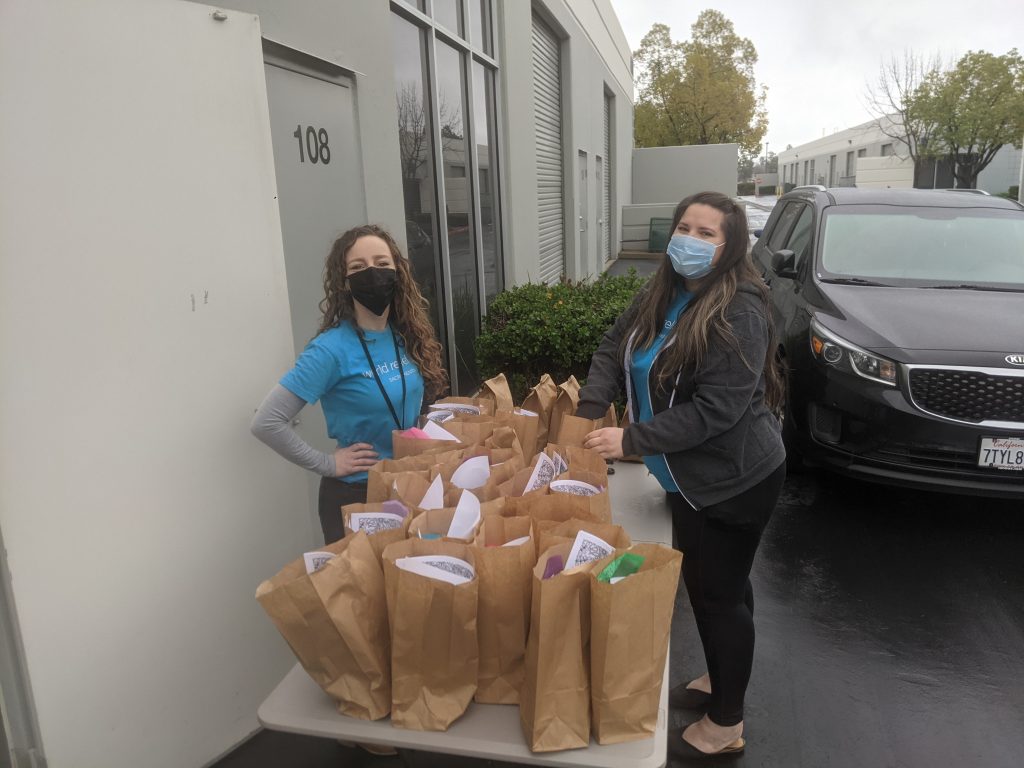
The bags are packed with goldfish crackers, contact paper and a booklet with the week’s Welcome Club theme: “Asking for Help and Giving Help.” Once filled, the bags are stapled shut with a note that says: DON’T OPEN UNTIL WELCOME CLUB. Becca and Makayla joke that most kids open their bags before club, but it’s worth a shot!
11:00 a.m.
Makayla takes a break from prepping goodie bags and logs into a Zoom meeting with a school vice-principal. This past summer, World Relief came together with local schools to talk about solutions for immigrant students who were falling behind due to COVID-19 and not logging onto Zoom for virtual learning.
Schools made a list of students who were struggling the most. Many of these students arrived in the U.S. just before the shutdown, and have never set foot in an American classroom. Since September, Makayla has logged 100 visits to over 50 of these families, checking in, walking through their assignments and giving them a laptop if they didn’t already have one.
12:00 p.m.
Makayla logs off Zoom and heads back to her car. She drives to the Las Palmas apartment complex, where many Afghan refugees live, to personally deliver 20 goodie bags. She barely sets foot in the courtyard when dozens of children and families approach and greet her excitedly. Ehsan, a seventh-grader who likes to help make deliveries, is among them.
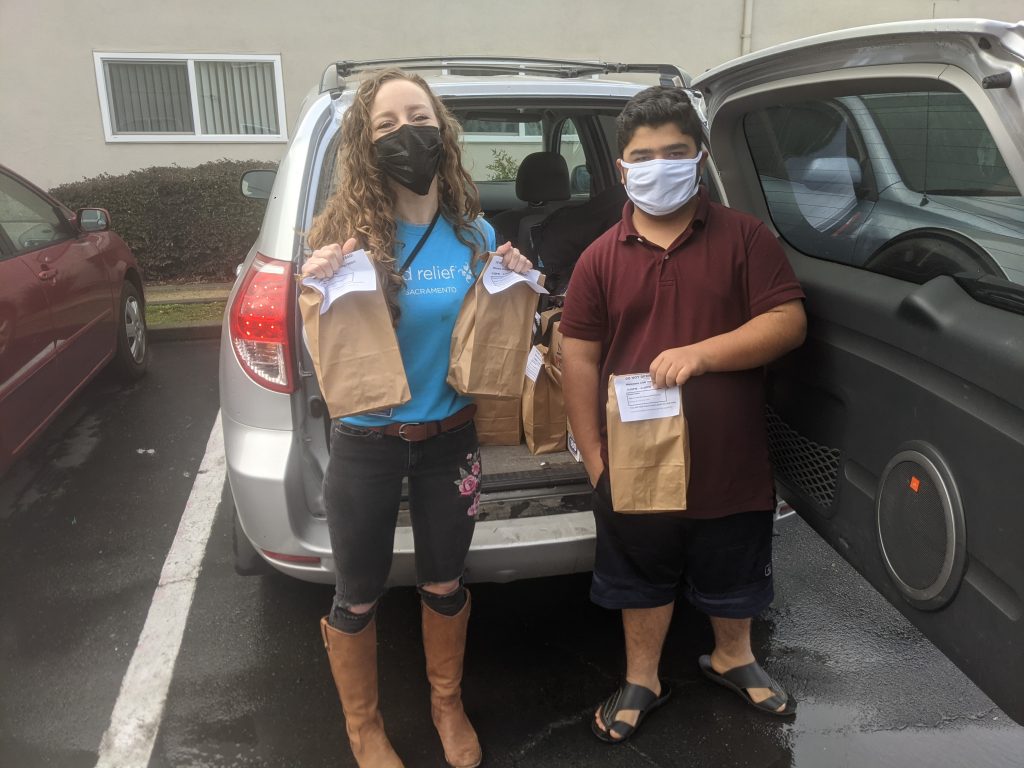
“I try to wait until he’s out of class,” Makayla says.
A group of children follow them from apartment to apartment. Mothers invite her in for tea. Her phone rings, and Makayla answers to help a student who is having an issue with her laptop. She stops to admire a girl’s braid, asks a boy about his school assignments, and greets everyone in Dari (the national Afghan language), which she’s trying to learn in her spare time.
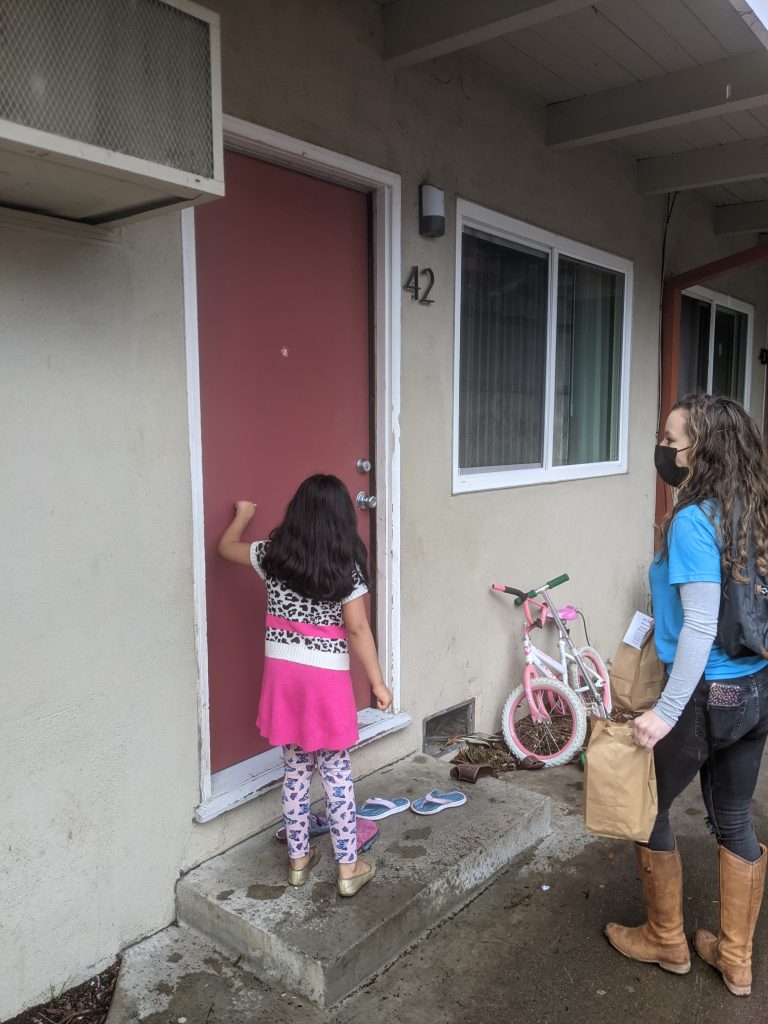
3:00 p.m.
Back at the office, Makayla and Becca log on to Welcome Club to meet with other staff and volunteers. Becca goes over the curriculum, assigning roles to each Coach. At 3:30, Makalya lets the students in from the waiting room, and soon two screens filled with 40 eager faces.
“Hi Coach Makayla! Hi Coach Becca!” The chat fills with messages of welcome and excitement.
“We are so happy you are here!” the coaches respond.
The students are always at the center of what Makayla and her team create — like the weekly Bad Banana videos that staff and students make together. Bad Banana is a character the team created to help illustrate the weekly themes.
Makayla dresses in a head-to-toe banana costume, draws on a mustache and puts on sunglasses. She is the “Bad Banana” who needs help from his Welcome Club friends. The name “Bad Banana” came from a nickname the students gave Makayla. Her name sounds like the word “kay-la” (phonetically spelled), which means banana peel in Dari, so students started calling her “Banana.”
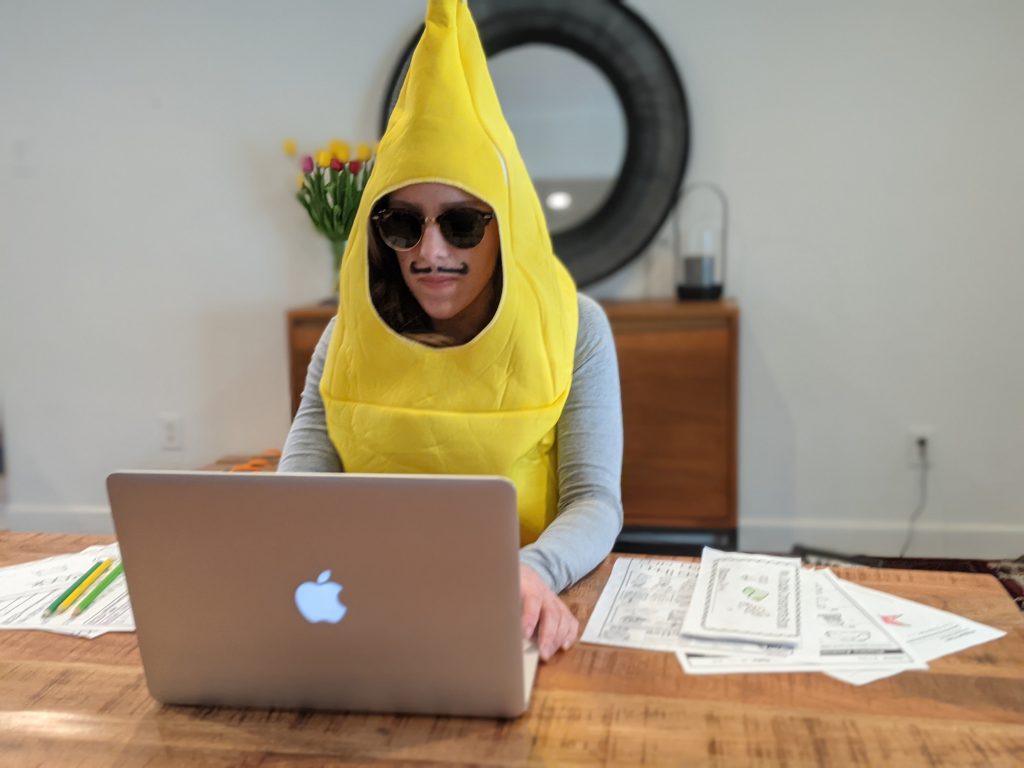
In this week’s video, Banana is struggling with distance learning. It’s too loud in his house and he can’t concentrate to do his schoolwork, so he calls his friend Horia from Welcome Club to ask her what to do. Horia tells Banana she was having a hard time, but then she asked Coach Makayla for help, and Makayla gave her headphones. Horia offers to ask on behalf of Banana, showing him what it means to be a helper.
4:00 p.m.
After the Coaches introduce themselves, students go into their breakout rooms where they play a game, talk about examples of when they gave and received help and complete the week’s craft together. During this time, Makayla moves in and out of breakout rooms.
4:30 p.m.
The students and coaches return to the main Zoom room. Makayla reminds them about tutoring on Tuesdays and Thursdays, and Becca shares the link to the latest Bad Banana video.
“Now, you have something fun to watch between now and the next Welcome Club,” she says.
The chat erupts with excited messages in response. Students sign off, though a few try to remain on for the coach’s debrief. Ehsan changes his name to “I’m a Coach!”
5:30 p.m.
After the staff debriefs, Makayla gathers up the remaining goodie bag items on the classroom floor. She makes a note of all the home visits she needs to schedule for the following week. She’s already thinking of ideas for next week’s club where they will introduce the new theme: perseverance.
Even after a full day, she is still energetic. The kids and their families make everything worth it. “Everyone who has ever succeeded at something had someone who believed in them,” she says. “I want to be one of those people who believe in them.”
There’s room for you to join staff and volunteers like Makayla as they make room for immigrants and refugees in the U.S. Give today to help programs like this flourish and enable our U.S. offices to start new ones!
To find out about local opportunities like volunteering, donating supplies, or becoming a WR Sacramento donor, find your nearest local U.S. office pages below!
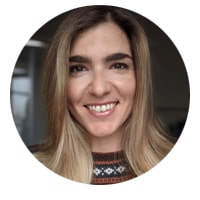
Vanassa Hamra serves as the Communications Manager for World Relief Sacramento. Her professional background is in creative writing and marketing, and she has worked in both the for profit and nonprofit sectors. She is passionate about storytelling and lives by the mantra that when you hear someone’s story, they move from being a stranger to becoming your neighbor.
Black History Month: Bringing home, home
As part of Black History Month, we’ve asked a few of the youth in the refugee community to tell us their experience learning about it. At World Relief, we work to honor and include all cultures and heritage, and celebrating Black history is just one way to do so. The second in a series of three, Reachaell, whom we spoke to in June as well, tells us about her own culture and how it ties into Black history.
Growing up in Africa, the life Reachaell has now was a far-away dream. As a child, she and her friends would go get water, and, amidst games of hide-and-seek, they would be playing another game as well—one where they would have to hide food under their bed to make sure no one would touch it.
When the opportunity presented itself to come to America, Reachaell was thrilled. After hearing the rumors of it in their refugee camp in Uganda, the U.S. seemed like a dream.
“We heard everything they were saying, and I was like, ‘Am I dreaming? Is this real?’” said Reachaell, who came when she was 14. “When I saw the plane sitting there, I was so excited.”
Despite the big change that it would bring and the family and friends that she would miss, Reachaell knew what it meant to be able to go to America. Her grandparents and uncle were already there, and, by coming to Memphis, the rest of the family would have a chance at a different life after having fled the Democratic Republic of Congo years earlier.
“[My grandparents] came to America for the same reason why we came. In Africa, there were people dying. They don’t have food. They don’t have homes to live in,” Reachaell, now 18, explained. “To come here, it’s a chance. It’s an honor.”
However, it does not mean that everything was always easy. When she arrived four years ago, Reachaell had never had the opportunity to go to school before, and she only spoke her native language of Swahili.
Yet in just four short months, she had already learned English thanks to a teacher who also spoke Swahili, and it opened the door for her to learn about other topics such as Black history.
“They talk about Black history in school, and it’s important to learn about [it.] It’s important because you really want to know what’s going on, what’s happening and stuff,” said Reachaell, who is now a senior at Douglass High School.
As a student attending school for the first time in her life, she was suddenly introduced to subjects and people she had never before heard about: Martin Luther King. Jr, Rosa Parks, the Civil Rights Movement.
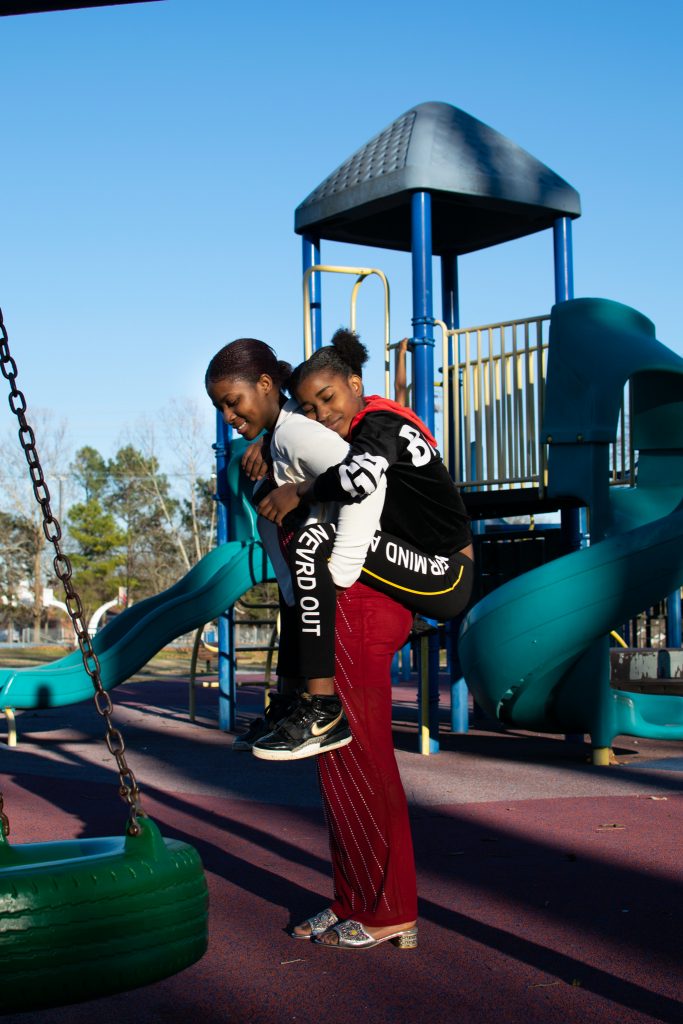
At the same time that she was learning about these iconic moments and the role models of Black history, she was also realizing the role she had to play in it too: “I’m here, so I feel like I’m a part of it.”
As a result, she would one day like to see her own culture represented here. Reachaell noted that when people speak about Africa, they tend to speak only about the poverty that is there. However, there is so much more to be celebrated than that, and it can be included in Black history as well.
In fact, her own role model, Zuchu, is a singer from Tanzania. She was the first East African female artist to receive more than 100,000 subscribers in a week, and she was recently named one of BBC’s 10 African music stars to watch for in 2021.
“I sing sometimes, and I would want to be like her,” said Reachaell, who started singing at the age of 6. “She works really hard, and she makes good music.”
This is just one small piece of culture and history that Reachaell has brought with her from Africa. Yet if there is one thing that she would take from the U.S. to her home, it would be school. The opportunity to learn, and to learn about Black history, is something she wishes everyone could experience.
“It’s not that I didn’t want to go to school, but my mom didn’t have money to pay for it,” said Reachaell. Instead, as the eldest of six children, she would stay home and care for her brothers and sisters.
“There’s a lot of things to learn. The [English] language, everything. History.”
Moving forward, it is no doubt that history will continue to evolve, and people everywhere will continue to learn from it. Perhaps one day, these stories will be included as well. For now, World Relief Memphis will continue to honor Black history and the diverse cultures around us not just in February but throughout the year.
Bailey Clark serves as the Communications Coordinator for World Relief Memphis. With a background in journalism and advertising, she is passionate about storytelling and its power to make a difference.








